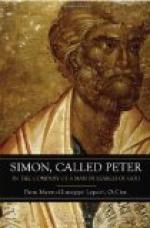“By Jove, skipper, you do have a good time out here!”
Harold flicked off the ash of his cigarette. “So, so, padre,” he said. “But the devil’s loose. It’s all so easy; I’ve never met a girl yet who was not out for a spree. Of course, we don’t see anything of the real French ladies, though, and this isn’t the line. By God! when I think of the boys up there, I feel a beast sometimes. But I can’t help it; they won’t pass me to go up, and it’s no use growling down here because of it.”
“I suppose not,” said Peter, and leaned back reflecting for the rest of the way. He felt as if he had known these men all his days, and as if his London life had been lived on another planet.
After lunch he was given a cubicle, and spent an hour or two getting unpacked. That done, just as he was about to sit down to a letter, there came a knock at the door, and Mackay looked in.
“You there, padre?” he asked. “There’s a lorry going up to town that has just brought a batch of men in: would you care to come? I’ve got to do some shopping, and we could dine at the club and come back afterwards.”
Peter jumped up. “Topping,” he said. “I want to get one or two things, and I’d love it.”
“Come on, then,” said the other. “I’ll meet you at the gate in five minutes.”
Peter got on his Sam Browne and went out, and after a bit Mackay joined him. They jolted up to town, and went first to the Officers’ Store at the E.F.C. Mackay bought some cigarettes, and Peter some flannel collars and a tie. Together the pair of them strolled round town, and put their heads in at the cathedral at Peter’s request. He had a vision of old grey stone and coloured glass and wide soaring spaces, but his impatient companion hauled him out. “Of course, you’ll want to see round, padre,” he said, “but you can do it some other time and with somebody else. I’ve seen it once, and that’s enough for me. Let’s get on to the club and book a table; there’s usually a fearful crowd.”
Peter was immensely impressed with the crowd of men, the easy greetings of acquaintances, and the way in which one was ignored by the rest. He was introduced to several people, who were all very cheerful, and in the long dining-room they eventually sat down to table with two more officers whom the Scotsman knew. Peter was rather taken with a tall man, slightly bald, of the rank of Captain, who was attached to a Labour Corps. He had travelled a great deal, and been badly knocked about in Gallipoli. In a way, he was more serious than the rest, and he told Peter a good deal about the sights of the town—the old houses and churches, and where was the best glass, and so on. Mackay and the fourth made merry, and Mackay, who called the W.A.A.C. waitress by her Christian name, was plainly getting over-excited. Peter’s friend was obviously a little scornful. “You’ll meet a lot of fools here, padre,” he said, “old and young. The other day I was having tea here when two old buffers came in—dug-outs, shoved into some job or another—and they sat down at the table next mine. I couldn’t help hearing what they said. The older and fatter, a Colonel, looked out of window, and remarked ponderously:




